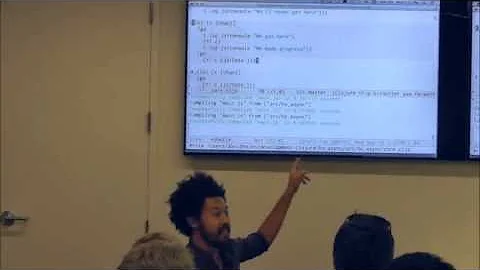How to write a dissoc-in command for clojure?
12,823
Solution 1
How about:
(defn dissoc-in
"Dissociates an entry from a nested associative structure returning a new
nested structure. keys is a sequence of keys. Any empty maps that result
will not be present in the new structure."
[m [k & ks :as keys]]
(if ks
(if-let [nextmap (get m k)]
(let [newmap (dissoc-in nextmap ks)]
(if (seq newmap)
(assoc m k newmap)
(dissoc m k)))
m)
(dissoc m k)))
Example:
(dissoc-in {:a {:b 0 :c 1}} [:a :b])
Result:
{:a {:c 1}}
dissoc-in was once part of clojure.contrib.core, and is now part of core.incubator.
If you want to keep empty maps, you can alter the code slightly:
(defn dissoc-in
[m [k & ks :as keys]]
(if ks
(if-let [nextmap (get m k)]
(let [newmap (dissoc-in nextmap ks)]
(assoc m k newmap))
m)
(dissoc m k)))
Example:
(dissoc-in {:a {:b {:c 0}}} [:a :b])
Result:
{:a {}}
Solution 2
I write this using update-in:
(update-in {:a {:b 0 :c 1}} [:a] dissoc :b)
=>
{:a {:c 1}}
Solution 3
Here is a general solution based on update-in:
(defn dissoc-in [m p]
(if (get-in m p)
(update-in m
(take (dec (count p)) p)
dissoc (last p))
m))
Solution 4
Being inspired by Dominic's code. I wrote a more succinct version
(defn dissoc-in
[m [k & ks]]
(if-not ks
(dissoc m k)
(assoc m k (dissoc-in (m k) ks))))
(dissoc-in {:a {:b {:c 1}}} [:a :b :c]) ;; => {:a {:b {}}}
Another version dissoc-in2 recursively removes empty maps
(defn dissoc-in2
[m [k & ks]]
(if-not ks
(dissoc m k)
(let [nm (dissoc-in2 (m k) ks)]
(cond (empty? nm) (dissoc m k)
:else (assoc m k nm)))))
(ut/dissoc-in {:a {:b {:c 3}}} [:a :b :c])
;;; => {:a {:b {}}}
(ut/dissoc-in2 {:a {:b {:c 3}}} [:a :b :c])
;;=> {}
Solution 5
No need to write one, clojure.core.incubator already has a dissoc-in:
=> (dissoc-in {:children [{:name "Billy" :age 5}]} [:children 0 :age])
{:children [{:name "Billy"}]}
Related videos on Youtube
Author by
zcaudate
Updated on June 19, 2022Comments
-
zcaudate almost 2 years
I'm looking to write a function that is similar to assoc-in but removes keys instead of adding it:
(dissoc-in {:a {:b 0}} [:a :b]) ;;=> {:a {}}I got up to here:
(def m {:a {:b {:c 1}}}) (assoc m :a (assoc (:a m) :b (dissoc (:b (:a m)) :c))) ;;=> {:a {:b {}}}but the whole nested thing is messing with my head
-
David J. over 8 yearsSee dev.clojure.org/jira/browse/CLJ-1063 "There is no clojure.core/dissoc-in although there is an assoc-in." created in September 2012.
-
-
0dB over 11 yearsIndeed, people have their own preferences whether empty maps should be removed or not, this is being discussed. In my use cases so far, I have chosen the original clojure.contrib.core code (quoted by Dominic above) which removes empty maps).
-
 Alan Thompson over 9 yearsDocs are at: github.com/clojure/core.incubator Current lein coords are [org.clojure/core.incubator "0.1.3"]. In your require use something like " [clojure.core.incubator :as cci]", then in program: (cci/dissoc-in {:a {:aa 1} :b {:bb 2}} [:a :aa]) yields {:b {:bb 2}}
Alan Thompson over 9 yearsDocs are at: github.com/clojure/core.incubator Current lein coords are [org.clojure/core.incubator "0.1.3"]. In your require use something like " [clojure.core.incubator :as cci]", then in program: (cci/dissoc-in {:a {:aa 1} :b {:bb 2}} [:a :aa]) yields {:b {:bb 2}} -
oskarkv over 9 years@0dB I just had a bug caused by removing empty maps. One of the maps was a priority map, not a regular map, so you can imagine what happened when I tried to use it later. (-> some-map (dissoc-in [:prio-map 123]) (assoc-in [:prio-map 234] something))
-
eyelidlessness over 9 yearsCould use
(drop-last p)instead of(take...). (Orbutlast, but that may be discouraged.) -
 DimaSan over 7 yearsWhile this code snippet may solve the question, including an explanation really helps to improve the quality of your post. Remember that you are answering the question for readers in the future, and those people might not know the reasons for your code suggestion.
DimaSan over 7 yearsWhile this code snippet may solve the question, including an explanation really helps to improve the quality of your post. Remember that you are answering the question for readers in the future, and those people might not know the reasons for your code suggestion. -
wedesoft about 3 yearsNice solution. Note that a special case is needed for a path-length of one. ``` (defn dissoc-in "Return nested hash with path removed" [m ks] (let [path (butlast ks) node (last ks)] (if (empty? path) (dissoc m node) (update-in m path dissoc node)))) ```










